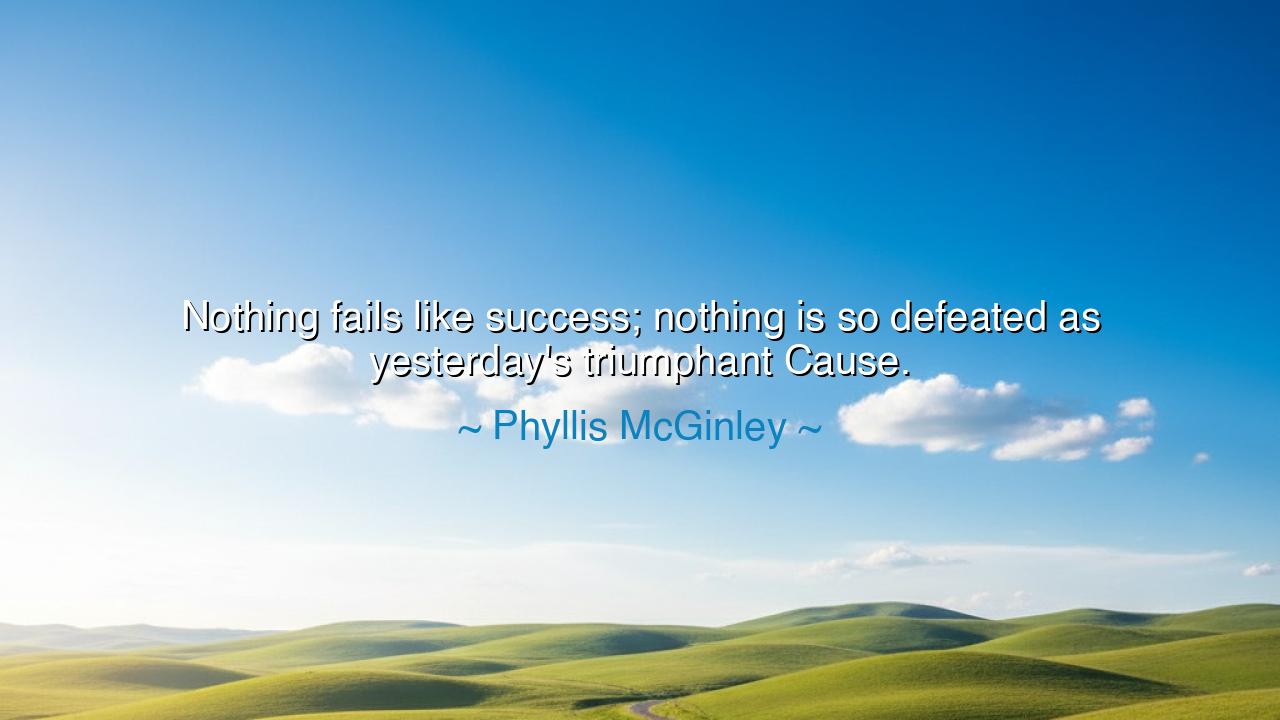
Nothing fails like success; nothing is so defeated as






Hear the words of Phyllis McGinley, who declared: “Nothing fails like success; nothing is so defeated as yesterday’s triumphant Cause.” At first, her words may sound strange, even paradoxical. How can success fail? How can triumph be defeated? Yet within her statement lies a truth deep as history: what shines brightest today may dim tomorrow, and the very crown of victory may become the chain of downfall. For all things, even glory, are bound by the turning wheel of time.
The heart of her teaching is this: when a Cause triumphs, it is often transformed by that triumph. It may become complacent, corrupt, or irrelevant to the struggles of a new age. What was once fiery and urgent grows stale, clinging to past victories rather than shaping the future. Thus success can fail more completely than defeat, for defeat humbles and teaches, but success can blind and weaken. Yesterday’s triumph, if worshiped instead of renewed, becomes tomorrow’s ruin.
History is full of such warnings. Consider the fall of the Roman Empire. Once, Rome was a triumphant Cause, conquering nations and bringing order to chaos. Yet its very success bred decadence and complacency. The empire turned inward, bloated with luxury, forgetting the discipline and vigor that had made it great. And so, what was once the glory of the world became the ruins of history. Rome’s failure was not in its weakness, but in its inability to sustain victory without renewal.
Think also of movements and inventions once hailed as the salvation of mankind. The Industrial Revolution, for example, brought progress, prosperity, and power. But unchecked, its triumphant Cause gave rise to pollution, exploitation, and despair. That which was once victory carried within it seeds of failure, because men forgot that success is never final, and every triumph must be guided into new forms of wisdom.
The meaning is thus twofold: first, do not rest upon success as though it were eternal; second, remember that every triumph must be transformed into new vision if it is to endure. The lesson of McGinley is not despair, but vigilance. Success can fail if we cling to it as an idol; but if we treat it as a stepping stone, it can become the foundation of greater triumphs. Yesterday’s victories are not meant to be worshiped, but to teach us how to win anew.
The lesson for us is clear: when you achieve, do not stop. When your Cause succeeds, do not assume the battle is over. Ask yourself instead: How must I renew this? How must I adapt to the challenges of tomorrow? For the world is always shifting, and the crown of today may become the relic of tomorrow. Only those who are willing to rise again, to learn again, to dare again, will carry their success forward without being consumed by it.
Practical actions follow. Celebrate your victories, but do not dwell in them. Learn from past triumphs, but do not live in their shadow. Seek always to refresh your vision, to adapt your Cause, to humble yourself even in the hour of glory. For in humility lies renewal, and in vigilance lies endurance. Treat success not as an end but as a seed, to be planted again and again in the soil of change.
Thus the words of Phyllis McGinley endure: “Nothing fails like success; nothing is so defeated as yesterday’s triumphant Cause.” Take them as a warning and a guide. Do not let your victories become your prison. Instead, let them be the fires that light the path to new beginnings. For only then will your triumphs endure, not as relics of the past, but as living forces shaping the future.






AAdministratorAdministrator
Welcome, honored guests. Please leave a comment, we will respond soon